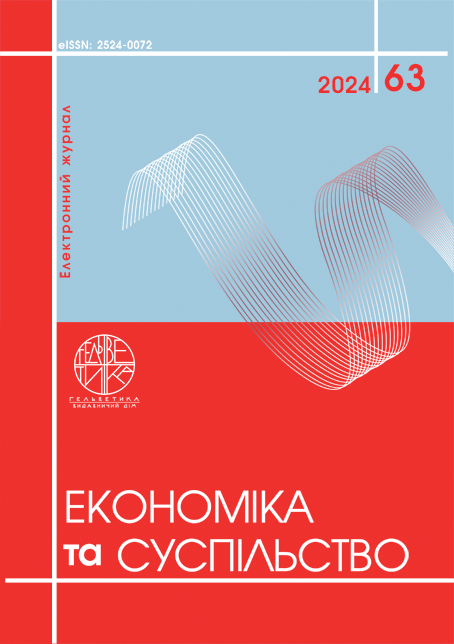ЕКОНОМІЧНА ЕФЕКТИВНІСТЬ ДИЗАЙНУ БРЕНДУ ГОТЕЛЮ
Анотація
Стаття розглядає дослідження процесу оцінки економічної ефективності дизайну бренду готельного підприємства. Визначено напрями і особливості оцінки ефективності на різних етапах дизайну бренду. Обгрунтовано, що дизайн готельного бренду стає впливовим каналом комунікації, і готельні підприємства все частіше використовують його у своїй діяльності. Отже, це дослідження розглядає питання про те, як взаємодія різних стратегій позиціонування готелю впливає на сприйняття споживачами дизайну бренду і їх лояльності до готелю. Це дослідження має на меті вивчити особливості економічної ефективності дизайну бренду готелю з використанням варіативної вибірки даних про готелі та готельні мережі, ввести економічні умови як новий детермінант ринкової вартості бренду готелів та перевірити стримуючу роль економічних умов на взаємозв'язок між інвестиціями у дизайн бренду та ринковою вартістю готельного підприємства в цілому.
Посилання
Shin H. (2023) Exploring open innovation engagement process of hotel brand community members: motivation, empowerment and consequences. International Journal of Contemporary Hospitality Management, no 35(12), pp. 4451–4467.
Khoi N. H., Le A. N. H. (2022) Is coolness important to luxury hotel brand management? The linking and moderating mechanisms between coolness and customer brand engagement. International Journal of Contemporary Hospitality Management, no 34(7), pp. 2425–2449.
Hegner S. M., Lotze C., & Beldad A. D. (2021) Emoticons are not for everyone: The role of congruence between hotel brand positioning strategies and communication style in enhancing customers’ brand attitude and booking intention. Tourism and Hospitality Research, no 21(3), pp. 317–329.
Cai R., Cain L. N., Jeon H. (2022) Customers’ perceptions of hotel AI-enabled voice assistants: does brand matter?. International Journal of Contemporary Hospitality Management, no 34(8), pp. 2807–2831.
Hegner S. M., Lotze C., Beldad A. D. (2021) Emoticons are not for everyone: The role of congruence between hotel brand positioning strategies and communication style in enhancing customers’ brand attitude and booking intention. Tourism and Hospitality Research, no 21(3), pp. 317–329.
Aljarah A., Ibrahim B., Lahuerta-Otero E., García de los Salmones, M. D. M. (2023) Doing good does not always lead to doing well: The corrective, compensating and cultivating goodwill CSR effects on brand defense. Current Issues in Tourism, no 26(20), pp. 3397–3410.
Choi J., Seo S. (2017) Goodwill intended for whom? Examining factors influencing conspicuous prosocial behavior on social media. International journal of hospitality management, no 60, pp. 23–32.
Lieven T., Grohmann B., Herrmann A., Landwehr J. R., Van Tilburg M. (2015) The effect of brand design on brand gender perceptions and brand preference. European Journal of Marketing, no 49(1/2), pp. 146–169.
Maurya U. K., Mishra P. (2012) What is a brand? A Perspective on Brand Meaning. European Journal of Business and Management, no 4(3), pp. 122–133.
Bresciani S., Del Ponte P. (2017) New brand logo design: customers’ preference for brand name and icon. Journal of Brand Management, no 24(5), pp. 375–390.
Tran X., Dauchez C., Szemik A. M. (2013) Hotel brand personality and brand quality. Journal of Vacation Marketing, no 19(4), pp. 329–341.
Mitra S., Jenamani M. (2020). OBIM: A computational model to estimate brand image from online consumer review. Journal of Business Research, no 114, pp. 213–226.
Widiatmoko D. P., Karyatun S., Digdowiseiso K. (2023) Influence Quality Product, Image Brand, and Promotion Regarding The Decision to Purchase Nike Shoes in Jakarta East. Jurnal Syntax Admiration, no 4(4), pp. 679-688.
Adisa I., Ibelegbu O., Chukwuka B. (2022). Brand Management During a Crisis: Lessons for Indigenous Hospitality Organisations in Africa. In Marketing Communications and Brand Development in Emerging Markets Volume II: Insights for a Changing World, Cham: Springer International Publishing, pp. 131–155.
Peres M. (2023) Hospitality Branding: Expressing the Brand Through Design and Transferable Experiences. In Communication Design and Branding: A Multidisciplinary Approach, Cham: Springer Nature Switzerland, pp. 223–241.
Авторське право (c) 2024 Маргарита Бойко, Марія Кулик, Наталія Зікій

Ця робота ліцензується відповідно до Creative Commons Attribution 4.0 International License.


